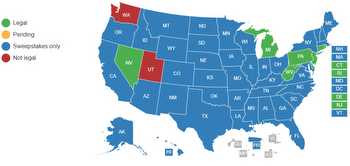Japan's Online Gambling Boom: Trends & Future
The Japanese online gambling market, currently on the brink of a significant transformation, is a sector worth exploring. With its projected revenue set to reach around US$6.19 billion in 2024 and an expected growth to US$7.50 billion by 2028, this market is a burgeoning giant in the global digital gaming landscape.
Market Dynamics and Growth
Japan’s online gambling market is experiencing rapid growth, driven by technological advancements and evolving social attitudes. The increasing prevalence of internet usage and the diversification of gaming platforms and types are key factors fueling this expansion.
Popular Games in the Japanese Market
The variety of games offered by Japanese online casinos reflects the diverse interests of players:
- Slot Machines: Popular for their simplicity and variety.
- Pachinko: A digital version of this classic game is widely played.
- Poker and Blackjack: Strategy-based games that attract skilled players.
- Bingo and Roulette: Games that offer a mix of luck and strategy.
- Baccarat: Known for its unique blend of simplicity and sophistication.
- Game Shows: Interactive experiences that broaden the market’s appeal.
The Influence of Japan-101.com
Japan-101.com stands as one of the most prominent online casino guides in Japan, wielding considerable influence over the market. Their advocacy for the legalization of online casinos is based on several potential benefits:
- Economic Growth: Legalization could boost the economy through job creation and increased tax revenues.
- Player Safety: Regulation would ensure responsible gaming practices and protect players.
- Innovation and Investment: Legalization could attract international investments, leading to technological advancements.
Regulatory Landscape
The regulatory framework governing Japan’s online gambling market is intricate and nuanced, often described as a ‘grey area.’ This term refers to the ambiguous legal status of online gambling activities within the country. While Japan’s strict gambling laws prohibit most forms of gambling, they do not explicitly cover the realm of online gambling, especially when it involves foreign-operated websites. This loophole has allowed Japanese players to participate in online gambling through offshore platforms without clear legal repercussions.
However, this grey area also means a lack of regulation and oversight, raising concerns about player protection, game fairness, and responsible gambling practices. As a result, there’s an ongoing debate and growing momentum towards adapting Japan’s gambling laws to better encompass and regulate the online gambling sector. The aim is to create a regulatory framework that not only legalizes online gambling but also ensures it contributes positively to the economy while safeguarding players against potential abuses and promoting responsible gambling behavior.
This evolving discussion involves various stakeholders, including government bodies, gambling operators, and advocacy groups. They are collectively navigating the complexities of integrating a traditionally conservative approach to gambling with the dynamic and rapidly growing online gambling industry. The outcome of this debate could set a precedent for how Japan balances economic interests with social responsibility in the digital age
Global Market Comparison
While Japan’s online gambling market is experiencing rapid growth, it still lags behind some of the world’s largest markets, particularly the United States, which is projected to generate a staggering US$23.03 billion in 2024. This stark contrast not only highlights the untapped potential of the Japanese market but also points to the significant opportunities that could arise from a more open and regulated framework.
Comparatively, in other Asian markets, the landscape varies considerably. For instance, China, with its stringent anti-gambling laws, has a virtually non-existent online gambling market. In contrast, the Philippines has embraced online gambling, with its PAGCOR (Philippine Amusement and Gaming Corporation) licensing many online operators, leading to a thriving industry. South Korea presents a mixed scenario where most forms of gambling are illegal for Korean citizens, yet the country hosts a number of casinos and a state-run lottery, indicating a potential for future online market development.
Similarly, India’s online gambling market is on a unique trajectory. Despite legal ambiguities and state-wise regulations, its market is flourishing, driven by a passion for sports betting and casino games, and is expected to grow significantly in the coming years.
These comparisons with other Asian markets illustrate the diverse approaches to online gambling regulation and the varying degrees of market maturity. Japan, with its robust economy and technological infrastructure, is well-positioned to become a major player in the online gambling sector if it adopts a more regulated and open approach. Such a move could not only propel Japan’s market growth but also set a benchmark for online gambling regulation in Asia.
Conclusion
The Japanese online gambling market is at a crossroads. Its growth, spurred by technological advancements and changing social norms, presents both opportunities and challenges. The insights and influence of Japan-101.com highlight the potential benefits of legalization, but these must be carefully weighed against the need for responsible gambling practices and robust regulatory frameworks. As the market continues to evolve, it will offer valuable lessons for the future of online gambling both in Japan and globally.



































